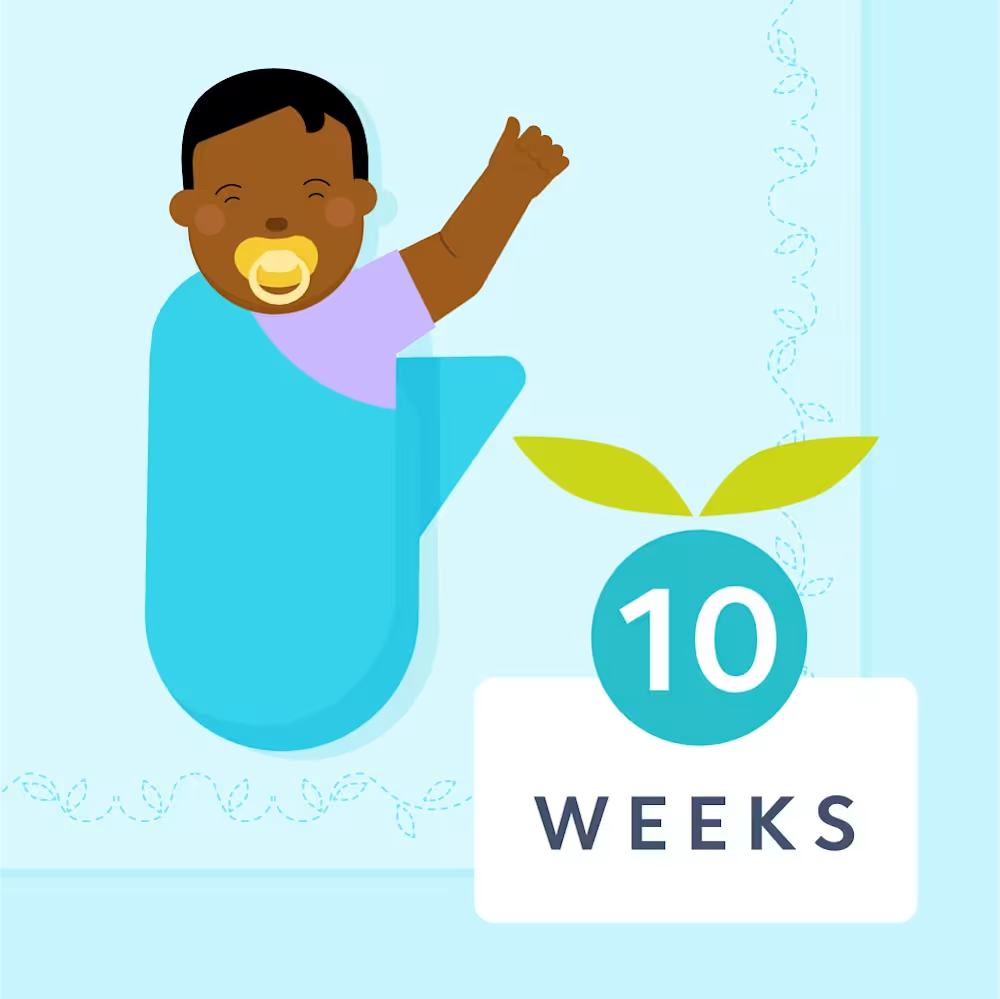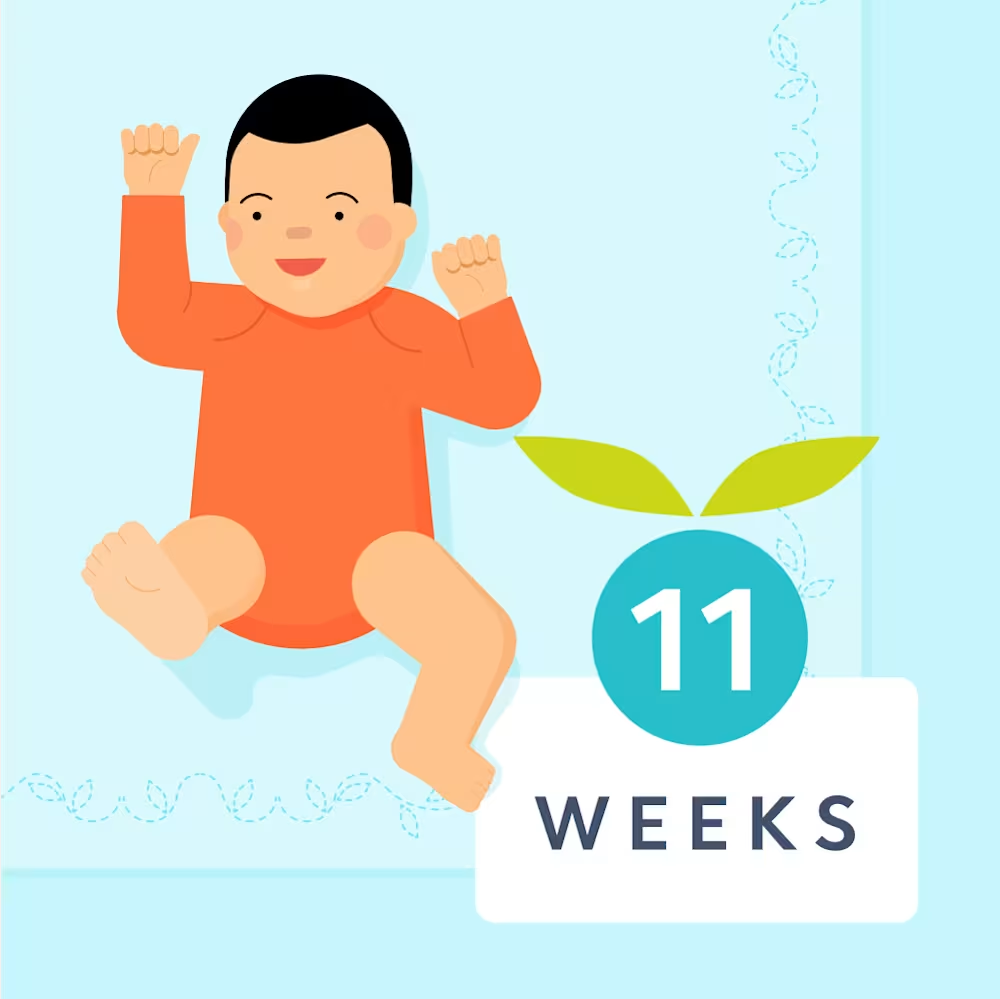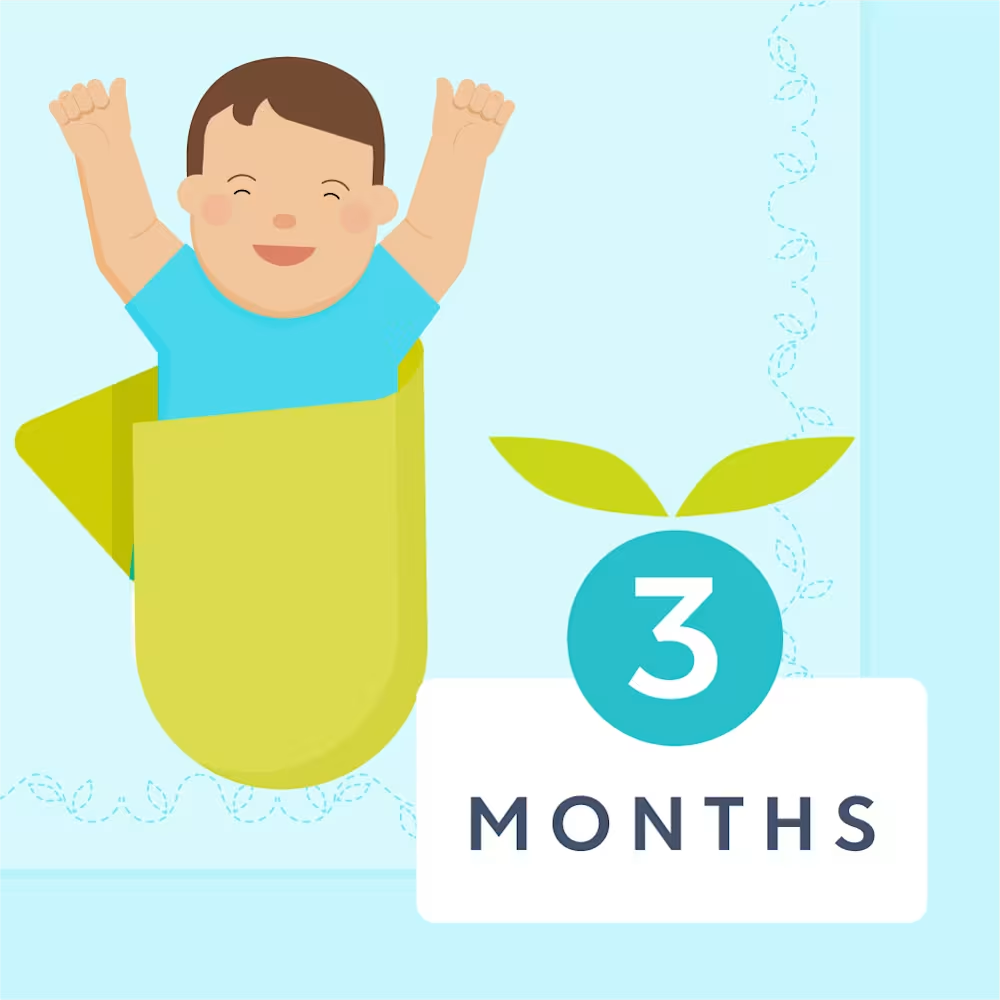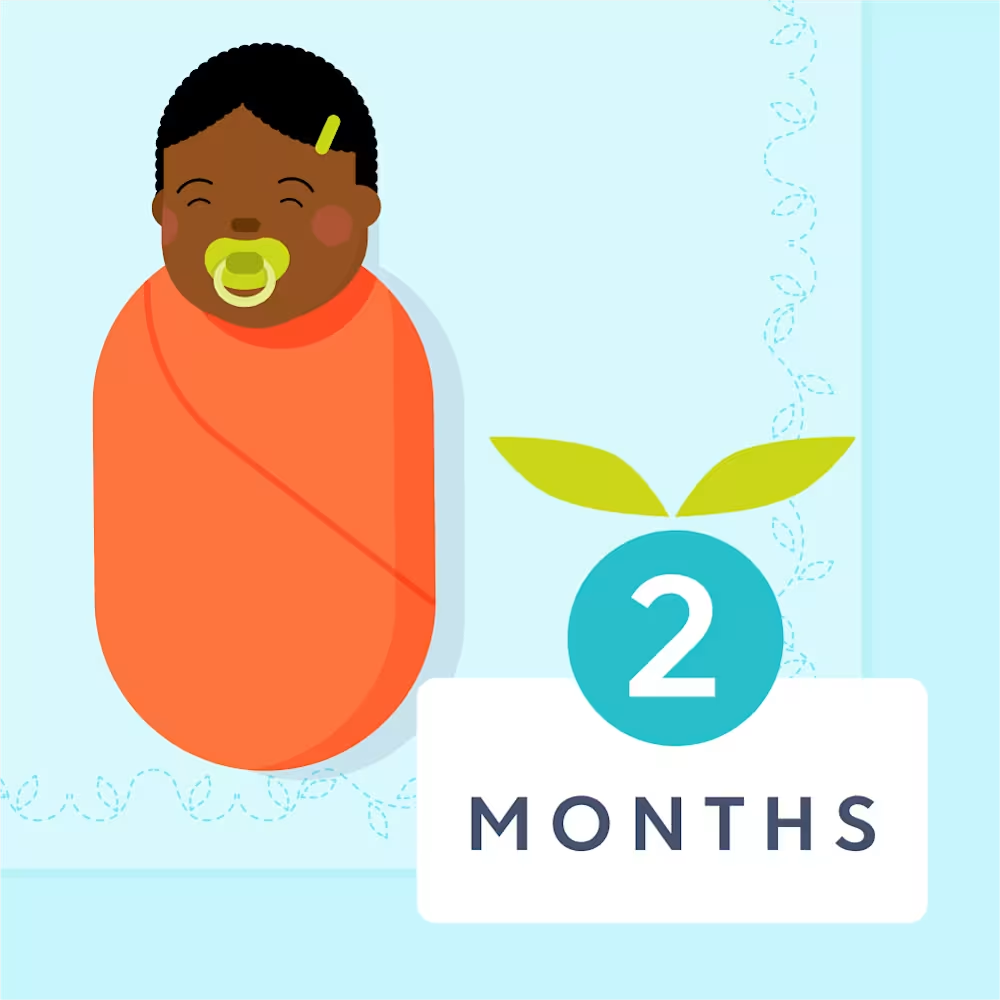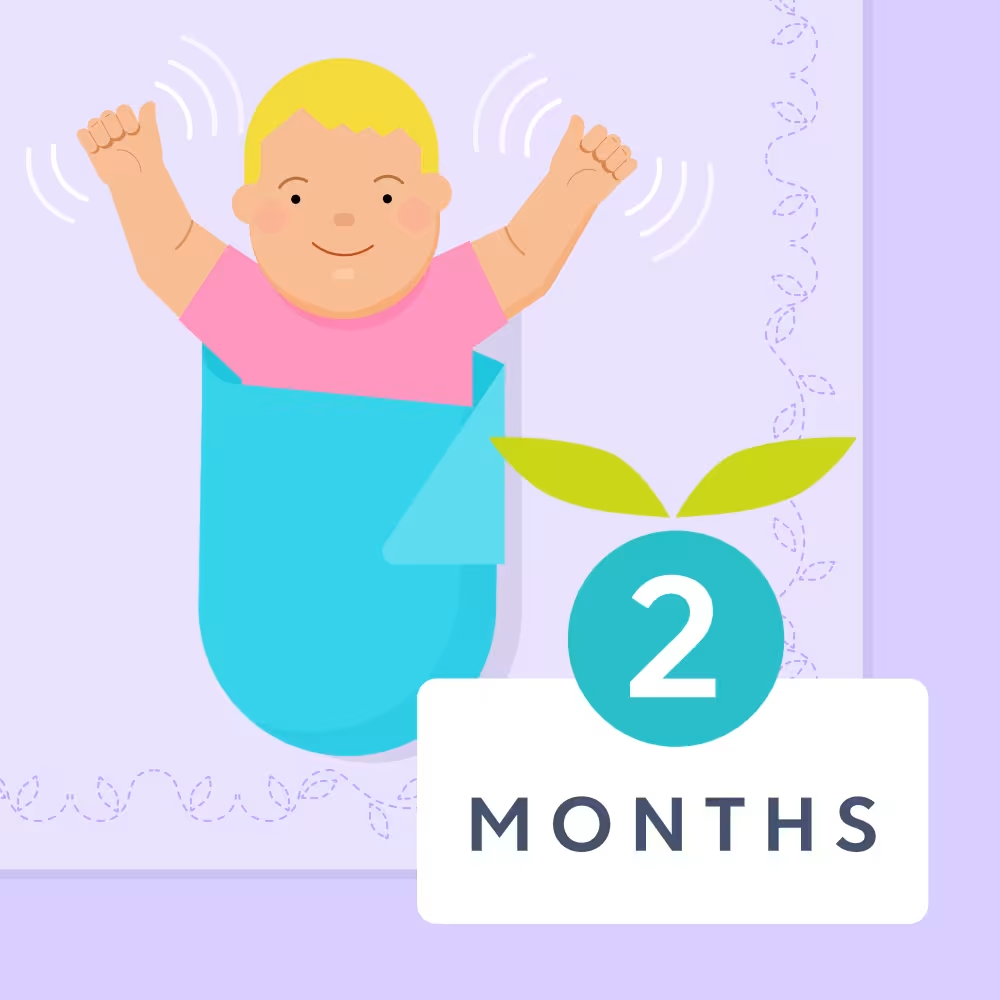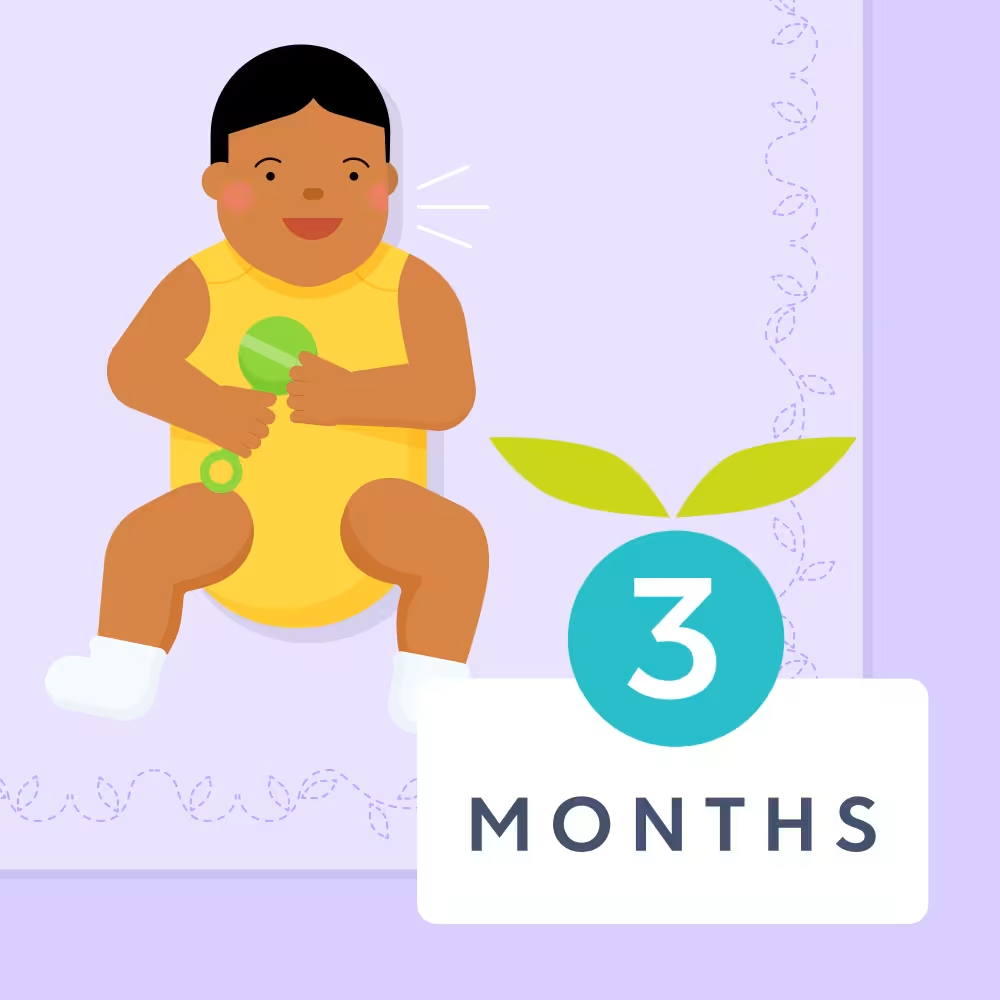9 week old sleep schedule: Bedtime and nap schedule
Updated Dec 15, 2025
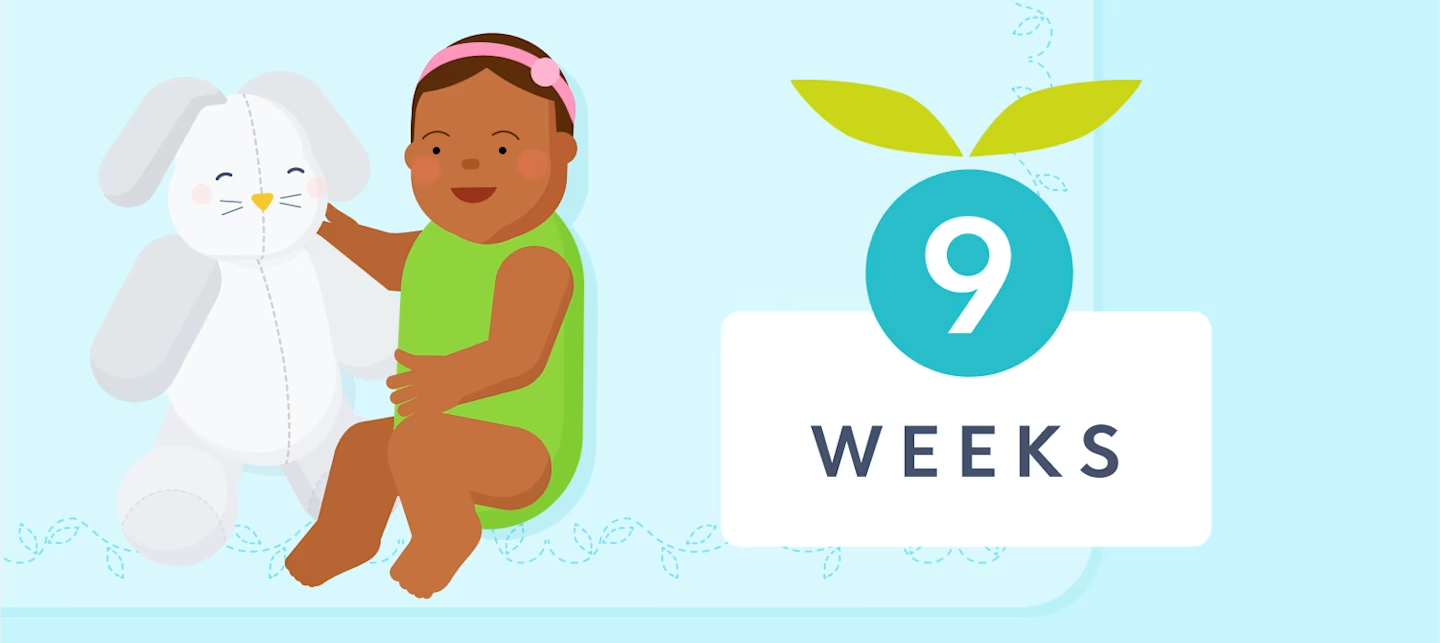
At just over 2 months old, your newborn’s sleep patterns will likely remain unpredictable. But the good news is they may have some longer stretches of night sleep now. Plus, a more regular 24-hour cycle of eating and sleeping is on the horizon for your little one, usually around .
In this article, we’ll help you understand what to expect when it comes to your baby’s naps and bedtime, give you tips for figuring out when your child may need to snooze next and answer frequently asked questions about sleep at 9 weeks.
How much should a 9 week old sleep?
At 9 weeks, we recommend aiming for around 15.5 hours of total sleep [] in a 24-hour period for your little one. This typically includes 5 - 6 hours of daytime sleep, split over 4 - 5 naps. However, keep in mind there’s a range of normal when it comes to babies and sleep development. It’s not uncommon for the amount your baby sleeps to vary from day to day at this age. For this reason, we suggest keeping tabs on your child’s overall mood and energy levels — instead of solely the number of hours of sleep each day — when determining if they’re getting enough shuteye.
Here's a quick overview of what you may expect when it comes to 9 week olds and sleep. Note that these figures are averages and should be used as guidelines.
Sample schedule for 9 week olds
At 9 weeks, your little one's "schedule" will likely still be unpredictable. Sleep times and durations will vary and this is normal! Here's what a day in the life of a 9 week old newborn may look like:

Top sleep tips for 9 week olds
Tip #1: Watch sleepy cues and wake windows
Sleep may be still at 9 weeks old — this is normal! We don’t expect babies to have more consistent sleep patterns until around when they’ll likely have a regular 24-hour cycle of eating and sleeping. To determine when your child may need to snooze in the meantime, we suggest paying attention to and .
Children at can usually comfortably stay awake for about 45 minutes - 1.75 hours. If your child has been awake for a length of time in this range and you notice any of their sleepy cues — like your child getting quiet, staring off into space, rubbing their eyes, etc. — this combination is typically a sign that your little one is ready for rest again. However, sleep cues can be fleeting and easy to miss. If your child hasn’t shown any sleepy signs, we recommend offering a nap after about 1.5 hours of awake time.
Tip #2: It may be time to stop swaddling
Around 2 - 3 months old, most babies will transition out of the swaddle. Keep in mind the American Academy of Pediatrics [] recommends removing the swaddle as soon as your baby shows any signs of rolling. If your little one is ready to move away from the swaddle, we recommend trying a (a wearable blanket) instead. Sleep sacks can help keep your baby warm, comfortable, and safe while they’re snoozing. Getting into a sleep sack can also be a great addition to your child’s .
Naptime schedule for 9 weeks
How long should a 9 week old nap?
We won’t expect a 9 week old to follow any patterns when it comes to nap length. Nap durations will be unpredictable at this age [] and daytime sleep may last anywhere from 10 minutes - 2 hours — and this may change from nap to nap. However, if you notice that your baby is sleeping longer periods during the day and it’s impacting their overnight sleep, you can limit each nap to 2 hours to help consolidate night sleep. This may also help regulate their schedule. Most babies at 9 weeks will get about 5 - 6 hours of daytime sleep per day.
How many naps for a 9 week old?
The number of naps your 9 week old takes depends on the length of their naps and how long they can comfortably stay awake between sleep periods. At this age, we typically see 4 - 5 naps per day with 45 minutes - 1.75 hours of awake time in between sleep periods. It’s not uncommon for every day to look different when it comes to daytime sleep, however. Some days your little one may nap for long stretches and the next day they may take short cat naps — both are normal at this age.
Bedtime for 9 week olds
Around 9 weeks, day-night rhythm emerges []. This means that sleep consolidates more into distinct day and night sleep patterns, rather than being distributed evenly throughout a 24-hour day. While this may result in some (very welcomed) longer stretches of overnight sleep, note that it’s still developmentally appropriate for newborns at 9 weeks to wake overnight for feedings and comfort. Consult with your child’s pediatrician or a lactation consultant regarding the specific number of feedings your little one needs at this age.
What time should a 9 week old go to bed?
Your baby’s bedtime will be determined by the time they woke up that morning [] and the quantity of naps they took that day. For this reason, at 9 weeks, it’s common for bedtime to be a bit different every day as there’s not much predictability yet when it comes to newborn sleep. Often bedtime will still be pretty late at this age. Your child’s longest stretch of sleep in a 24-hour period may come after 10:00 PM!
Note that we don’t recommend keeping your little one awake for long stretches during the day in an attempt to get to an earlier bedtime or longer stretches of overnight sleep. While it sounds like a good plan, in theory, it can lead to overtiredness. When a child is overtired, it makes it harder for them to fall asleep and stay asleep. While late bedtimes can be tricky for parents’ schedules, once your child’s internal clock is fully developed (around 3 - 4 months), bedtime will likely shift earlier. You’ll get there!
Why does my 9 week old keep waking up at night crying?
At 2 months, your baby might begin to sleep in slightly longer stretches at night — a welcome shift for many parents! That said, frequent night waking is still completely normal and developmentally appropriate. At this age, babies typically continue to wake for feedings and comfort. Every little one is different, so night sleep can still vary quite a bit from day to day.
Is there a sleep regression at 9 weeks old?
Newborn sleep is unpredictable, so frequent night wakings and short naps are expected at this age — this phase of irregular sleep isn’t considered a “regression.” Your baby may even be sleeping a little better at 2 months as has likely resolved, which leads to some babies being able to snooze for longer periods overnight.
Can my 9 week old sleep with a pacifier?
Pacifiers can be offered to your baby at 9 weeks, though not all babies will be interested. The AAP encourages pacifier use during sleep times as it may offer comfort and lower the risk of sudden infant death syndrome (SIDS) []. They’re also commonly recommended for preterm or low-birth-weight babies to support the development of their sucking reflex [].
However, the AAP cautions against using a pacifier to replace (or delay) breast milk or formula feedings that are vital for a baby’s growth and brain development.
Should I swaddle my 9 week old?
You can continue swaddling your baby at 2 months if they aren’t yet showing signs of rolling over, which some little ones may begin doing around this time []. If your baby is attempting to roll or isn’t a fan of traditional swaddles, there are safe . Transitional swaddles and sleep sacks offer a cozy, secure feel without restricting arm movement, making them a great option for this stage.
Can I sleep train a 9 week old?
Sleep training at 9 weeks. It’s normal for little ones at this age to need help from a caregiver to fall asleep — and stay asleep. They often rely on comforting cues like rocking, feeding, or cuddling to settle. If you’re looking for ways to help your baby , consider some of our for healthy newborn sleep hygiene.
Can a 9 week old sleep on their stomach or side?
At 2 months, always place your baby on their back for sleep — not on their stomach or side — in line with the AAP’s safe sleep recommendations []. This position helps reduce the risk of SIDS. Once your little one can roll both ways independently (from back to front and front to back), it’s okay to let them find their own sleep position without repositioning them.
What are the developmental milestones for a 9 week old?
, your baby might be starting to push up with their hands during tummy time and flash a smile when they see your face — exciting new milestones! Keep in mind there’s a wide range of what's considered typical, and not all babies hit these milestones at the same time. Most little ones will try these skills by 12 weeks, but some take a bit longer. If you ever have questions or concerns about your baby’s development, don’t hesitate to reach out to their healthcare provider.
Holds head up briefly when on tummy
Begins to push up on hands during tummy time
Moves arms and legs more smoothly
Makes cooing noises
Briefly opens or relaxes hands
Cries to communicate most needs
Smiles at your face and seems happy to see you
Looks toward loud noises
May put hand to mouth
Does a 9 week old need to eat during the night?
Some 9 week old babies may start sleeping longer stretches at night as day/night confusion fades, though this can vary depending on your baby and their feeding needs. It’s still completely normal and developmentally appropriate for babies this age to wake up hungry during the night. Many babies also experience a around 3 months, which can lead to increased nighttime feedings.
We recommend continuing to feed on demand and checking in with your pediatrician if you have any questions about your newborn's overnight feeding needs.
Takeaway
Aim for around 15.5 hours of total sleep over a 24-hour period, including about 5 to 6 hours of daytime sleep spread across 4 to 5 naps. Keep in mind that every baby is different, and sleep patterns are still developing at this stage. Flexibility is key — some days may look completely different than others, and that’s perfectly normal.
Most babies at 9 weeks need 4 - 5 naps per day, with 45 minutes to 1.75 hours of awake time between sleep periods.
Official sleep training isn't recommended at this age due to the immature sleep-wake system. However, you can start setting a solid sleep foundation by creating opportunities for your baby to fall asleep in their sleep space after calm bedtime rituals.
Bedtimes at this age can be late, often after 9:00 PM. Bedtime will be determined by the morning wake-up time and sleep durations throughout the day.
Expect babies to wake during the night for feedings and comfort. Consult with healthcare professionals for guidance on night feedings.
If you're curious about what lies ahead in the next month, glimpse into the future to see what you might experience once your baby is a . Take a look back at how far your baby has come by revisiting what they may have been like as a .
Share article:
Note: The content on this site is for informational purposes only and should not replace medical advice from your doctor, pediatrician, or medical professional. If you have questions or concerns, you should contact a medical professional.
8 Sources
Share article:
